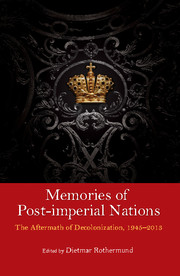Book contents
- Frontmatter
- Contents
- Preface
- Introduction
- 1 Memory of Empire in Britain: A Preliminary View
- 2 Ruptures and Dissonance: Post-colonial Migrations and the Remembrance of Colonialism in the Netherlands
- 3 A Distinctive Ugliness: Colonial Memory in Belgium
- 4 The Post-colonial Encounter in France
- 5 Ideologies of Exceptionality and the Legacies of Empire in Portugal
- 6 Post-colonial Italy: The Case of a Small and Belated Empire: From Strong Emotions to Bigger Problems
- 7 Post-imperial Japan in Transnational Perspective
- 8 Memories of Post-imperial Nations
- 9 A View from the Gallery: Perspective of a ‘Colonized’ on Post-imperial Memories
- Contributors
- Index
5 - Ideologies of Exceptionality and the Legacies of Empire in Portugal
Published online by Cambridge University Press: 05 September 2015
- Frontmatter
- Contents
- Preface
- Introduction
- 1 Memory of Empire in Britain: A Preliminary View
- 2 Ruptures and Dissonance: Post-colonial Migrations and the Remembrance of Colonialism in the Netherlands
- 3 A Distinctive Ugliness: Colonial Memory in Belgium
- 4 The Post-colonial Encounter in France
- 5 Ideologies of Exceptionality and the Legacies of Empire in Portugal
- 6 Post-colonial Italy: The Case of a Small and Belated Empire: From Strong Emotions to Bigger Problems
- 7 Post-imperial Japan in Transnational Perspective
- 8 Memories of Post-imperial Nations
- 9 A View from the Gallery: Perspective of a ‘Colonized’ on Post-imperial Memories
- Contributors
- Index
Summary
Introduction
Any understanding of the historical transformation of Portuguese society since the mid-nineteenth century must acknowledge the existence of two fundamental, inseparable and mutually constitutive processes, which must be necessarily analysed within a common framework. These were connected to a long process of constitution of an ‘empire-nation-state’ in which the mechanisms and processes of ‘empire-rebuilding, nation-reformation and state-remaking’ were interdependent and mutually reinforcing. On one hand there was the nationalization of the empire, that is the political, economic and, to a lesser extent, socio-cultural mechanisms and processes that were mobilized by the Portuguese authorities in order to rebuild an imperial configuration after the disintegration of the Luso-Brazilian Empire in the beginning of the nineteenth century, on the other, as importantly, with undeniable contemporary resonances, the imperialization of the nation-state, at a political, economic and ideological-identitarian levels, that is, the growing relevance of the imperial dimension as a political and economic instrument of national regeneration, and as the fundamental cultural and symbolic resource in the longue durée dynamic constitution of the national identity. The efforts to imperialize the nation-state were plural and historically variegated. As in other imperial formations, these processes entailed the elaboration and public dissemination of ideologies of historical mission and exceptionality – the mission to colonize and the mission to civilize – which revealed an enduring imperial imagination that still resonates in contemporary Portuguese society.
For a country with a history that is so marked by the diverse facets of its imperial and colonial past, the theme of imperial memory is a recurring presence in contemporary Portugal. Since the end of the nineteenth century ‘national identity’, empire and, later, the post-colonial lusophone space, were integrated into the public sphere and the political arena, becoming central dimensions in Portuguese politics and culture. From television contests to school apparatus, the most popular historical figures to emerge in contemporary Portuguese society are the navigators – Vasco da Gama and Pedro Alvares Cabral.
- Type
- Chapter
- Information
- Memories of Post-Imperial NationsThe Aftermath of Decolonization, 1945–2013, pp. 97 - 119Publisher: Cambridge University PressPrint publication year: 2015
- 4
- Cited by



